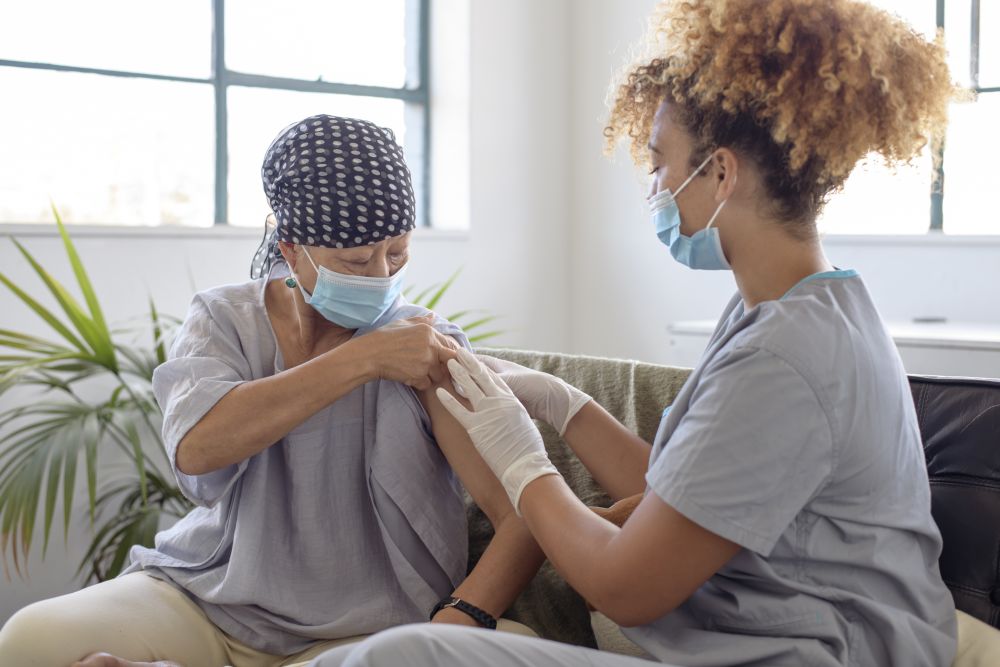August is National Immunization Awareness Month, created to highlight the importance of vaccination for people of all ages. People with cancer, especially those undergoing chemotherapy and radiation therapy, may have weakened immune systems, which puts them at an increased risk of serious infections. With COVID-19 remaining a health concern and flu season approaching, it’s important to understand how vaccinations can best protect you.
COVID-19 Recommendations for People with Cancer
The Centers for Disease Control (CDC), National Comprehensive Cancer Network (NCCN), and American Cancer Society (ACS) all recommend that cancer patients be vaccinated with primary COVID-19 vaccinations as well as booster doses. While these vaccines might not be as effective in those undergoing cancer treatment, they still provide some protection and can reduce the risk of severe complications from COVID-19.
The CDC recommendations for those with a moderately to severely weakened immune system are based on age and the type of COVID vaccines previously received. For those 12 years and older--including blood cancer patients and patients receiving treatment, general recommendations are as follows:
- Unvaccinated patients should receive three doses of an updated bivalent mRNA vaccine.
Current Pfizer-BioNTech and Moderna bivalent vaccines contain mRNA components that offer protection from the original virus and newer variants. These vaccines are preferred for those with a weakened immune system. You cannot get COVID-19 from these vaccines. - Patients who received the original monovalent mRNA vaccines should receive one or two doses of a bivalent vaccine, depending on the number of initial monovalent doses received.
- Novavax or Johnson & Johnson vaccine recipients should get one dose of an updated bivalent vaccine.
- All individuals in this group may receive another dose of the bivalent vaccine at least two months after the last bivalent dose. Your healthcare provider may recommend additional doses.
Guidelines are based on best practices. However, each patient is unique. Vaccine doses and staging should be planned with your care team for the best possible outcomes and to avoid any disruption in treatment.
Further, it is recommended that caregivers and close contacts be vaccinated against COVID-19 to help lower the risk for the person they are caring for. Continued mask-wearing for patients and caregivers can also minimize the risk of getting COVID-19.
Are there any special circumstances for receiving a COVID-19 vaccination while undergoing treatment?
Most cancer patients, including patients undergoing active treatment, should receive the initial vaccine doses and boosters as soon as possible. However, people in the process of stem cell transplants or cellular therapy should wait at least three months after finishing treatment to be vaccinated. Those undergoing major surgery may also need to wait up to two weeks before vaccination.
Flu Shot Recommendations for People with Cancer
People with cancer may be at a higher risk for complications from influenza. These may include dehydration, sinus or ear infections, bronchitis, pneumonia, sepsis, or inflammation of the heart, brain, or muscle tissues. Cancer patients should receive the flu shot with the inactive virus yearly. The CDC recommends that most adults receive the flu shot in September or October of each year, but people with cancer should consult their cancer care team on the best time to receive the flu vaccine for their cancer type and treatment plan.
People with cancer should not receive the nasal mist flu vaccine, which contains a weakened version of the live virus. Family members of a person with cancer may receive the nasal mist flu vaccine unless the patient has a severely weakened immune system or is being cared for in a germ-protected environment.
Ask Your Physician About Recommended Immunizations
Before receiving any immunizations, speak to your physician about your risk factors for vaccine-preventable diseases. Your physician will help you determine which vaccines are most appropriate and effective, where on your body to receive them to avoid secondary complications, and the best timing for your treatment plan.




